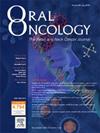经口手术治疗hpv相关口咽癌老年患者的辅助治疗
IF 4
2区 医学
Q1 DENTISTRY, ORAL SURGERY & MEDICINE
引用次数: 0
摘要
老年人hpv相关口咽鳞状细胞癌(OPSCC)患者的比例越来越大,经口手术(TOS)仍然是这一人群的有效治疗选择。本研究旨在评估辅助治疗对该组患者生存结局的影响。方法本回顾性研究分析了国家癌症数据库(NCDB)中诊断为OPSCC并接受原发性TOS治疗的老年人(≥65岁)的数据。根据具体的病理标准将患者分为低、中、高危组。使用多变量Cox回归模型评估辅助治疗的生存获益。结果998例因hpv相关OPSCC行原发性TOS的患者分为低危组(N = 347, 34.8%)、中危组(N = 261, 26.1%)和高危组(N = 390, 39.1%)。辅助治疗在低(调整后HR: 0.70;95% CI: 0.33-1.47)和中间(HR: 0.73;95% CI: 0.36-1.48)风险组。辅助治疗在高危组是有益的(调整HR: 0.40, 95% CI: 0.25-0.62),辅助放化疗(调整HR: 0.28 95% CI: 0.16-0.48;p & lt;0.001)显示出与单独放疗相比略有优势(调整后HR: 0.61, 95% CI: 0.36-1.03)。结论老年OPSCC患者应选择性应用辅助治疗,主要在高危患者中观察到显著的生存获益。需要进一步的研究来确认治疗降级策略在这一人群中的安全性和有效性。本文章由计算机程序翻译,如有差异,请以英文原文为准。
Adjuvant treatment in elderly patients undergoing transoral surgery for HPV-related oropharyngeal cancer
Objectives
Older adults are an increasing proportion of patients with HPV-related oropharyngeal squamous cell carcinoma (OPSCC), and transoral surgery (TOS) remains a valid treatment option for this population. This study aimed to evaluate the impact of adjuvant therapy on survival outcomes in this group.
Methods
This retrospective study analyzed data from the National Cancer Database (NCDB) for older adults (≥65 years) diagnosed with OPSCC and treated with primary TOS. Patients were stratified into low, intermediate, and high-risk groups according to specific pathological criteria. The survival benefit of adjuvant therapy was assessed using a multivariable Cox regression model.
Results
A total of 998 patients undergoing primary TOS for HPV-related OPSCC were classified in low (N = 347, 34.8 %), intermediate (N = 261, 26.1 %) and high (N = 390, 39.1 %) risk groups. Adjuvant treatment showed no significant benefit in the low (adjusted HR: 0.70; 95 % CI: 0.33–1.47) and intermediate (HR: 0.73; 95 % CI: 0.36–1.48) risk groups. Adjuvant treatment was beneficial in the high risk group (adjusted HR: 0.40, 95 % CI: 0.25–0.62), with adjuvant chemoradiotherapy (adjusted HR: 0.28 95 % CI: 0.16–0.48; p < 0.001) showing a slight advantage compared to radiotherapy alone (adjusted HR: 0.61, 95 % CI: 0.36–1.03).
Conclusion
The findings suggest that adjuvant therapy should be selectively applied in older adults with OPSCC, with a significant survival benefit observed primarily in high-risk patients. Future studies are needed to confirm the safety and efficacy of treatment de-escalation strategies in this population.
求助全文
通过发布文献求助,成功后即可免费获取论文全文。
去求助
来源期刊

Oral oncology
医学-牙科与口腔外科
CiteScore
8.70
自引率
10.40%
发文量
505
审稿时长
20 days
期刊介绍:
Oral Oncology is an international interdisciplinary journal which publishes high quality original research, clinical trials and review articles, editorials, and commentaries relating to the etiopathogenesis, epidemiology, prevention, clinical features, diagnosis, treatment and management of patients with neoplasms in the head and neck.
Oral Oncology is of interest to head and neck surgeons, radiation and medical oncologists, maxillo-facial surgeons, oto-rhino-laryngologists, plastic surgeons, pathologists, scientists, oral medical specialists, special care dentists, dental care professionals, general dental practitioners, public health physicians, palliative care physicians, nurses, radiologists, radiographers, dieticians, occupational therapists, speech and language therapists, nutritionists, clinical and health psychologists and counselors, professionals in end of life care, as well as others interested in these fields.
 求助内容:
求助内容: 应助结果提醒方式:
应助结果提醒方式:


